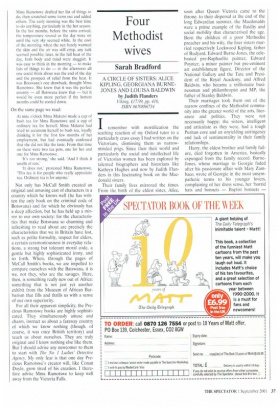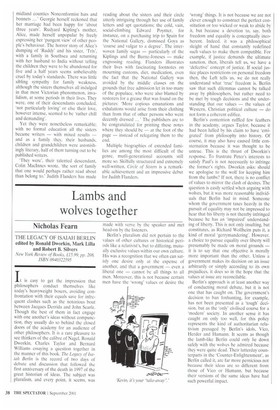Four Methodist wives
Sarah Bradford
A CIRCLE OF SISTERS: ALICE KIPLING, GEORGIANA BURNEJONES AND LOUISA BALDWIN by Judith Flanders Viking, £17.99, pp. 416, ISBN 0670886734 Iremember with mortification the scathing reaction of my Oxford tutor to a particularly crass essay I had written on the Victorians, dismissing them as narrowminded prigs. Since then their world and particularly the social and intellectual life of Victorian women has been explored by talented biographers and historians like Kathryn Hughes and now by Judith Flanders in this fascinating book on the Macdonald sisters.
Their family lives mirrored the times. From the birth of the eldest sister, Alice, soon after Queen Victoria came to the throne, to their dispersal at the end of the long Edwardian summer, the Macdonalds were a prime example of the fluidity and social mobility that characterised the age. Born the children of a poor Methodist preacher and his wife, the four sisters married respectively Lockwood Kipling, father of Rudyard, Edward Burne-Jones, the celebrated pre-Raphaelite painter, Edward Poynter, a minor painter but pre-eminent art establishment figure. Director of the National Gallery and the Tate and President of the Royal Academy, and Alfred Baldwin, who became a millionaire businessman and philanthropist and MP, the father of Stanley Baldwin.
Their marriages took them out of the narrow confines of the Methodist community into the greater world of the arts, literature and politics. They were not necessarily happy; the sisters, intelligent and articulate as they were, had a tough Puritan core and an unyielding astringency and lack of sentimentality in their family relationships.
Harry, the eldest brother and family failure, died forgotten in America, basically expunged from the family record. BurneJones, whose marriage to Georgie faded after his passionate affair with Mary Zambaco, wrote of Georgie in the most unsympathetic terms to his younger lovers, complaining of her dress sense, her 'horrid hats and bonnets — Baptist bonnets — midland counties Nonconformist hats and bonnets ... ' Georgie herself reckoned that her marriage had been happy for 'about three years'. Rudyard Kipling's mother. Alice, made herself unpopular by freely expressing her 'pungent view' of other people's behaviour. The horror story of Alice's dumping of 'Ruddy' and his sister, 'Trix', with a family in Southsea and returning with her husband to India without telling the children they were to be abandoned for five and a half years seems unbelievably cruel by today's standards. There was little sibling sympathy for family weakness, although the sisters themselves all indulged in that most Victorian phenomenon, invalidism, at some periods in their lives. They were, one of their descendants concluded, 'not particularly loving' or else their love, however intense, seemed to be 'rather chill and demanding'.
Yet they were nonetheless remarkable; with no formal education all the sisters became writers — with mixed results — and as a family they, their husbands, children and grandchildren were astonishingly literary, half of them turning out to be published writers.
'They were', their talented descendant, Cohn Maclnnes wrote, 'the sort of family that one would perhaps rather read about than belong to.' Judith Flanders has made reading about the sisters and their circle utterly intriguing through her use of family letters and apt quotations; the cold, vain, social-climbing Edward Poynter, for instance, on a purchasing trip to Spain for the National Gallery, dismissed Goya as 'coarse and vulgar to a degree'. The interwoven family sagas — particularly of the Kiplings and the Burne-Joneses — make engrossing reading. Flanders illustrates their lives with fascinating footnotes on mourning customs, diet. medication, even the fact that the National Gallery was avoided by the middle classes on the grounds that free admission let in too many of the populace, who were also blamed by restorers for a grease that was found on the pictures: 'More copious emanations and exhalations would arise from their clothing than from that of other persons who went decently dressed ... The publishers are to be congratulated for printing these notes where they should be — at the foot of the page — instead of relegating them to the end.
Multiple biographies of extended families are among the most difficult of the genre, mutli-generational accounts still more so. Skilfully structured and extremely well-written, Circle of Sisters is a remarkable achievement and an impressive debut for Judith Flanders.



























































 Previous page
Previous page